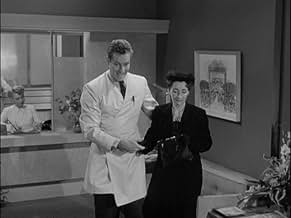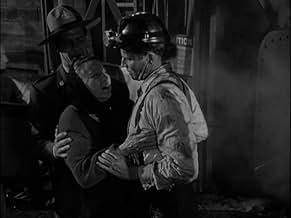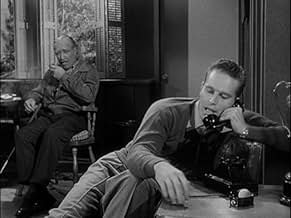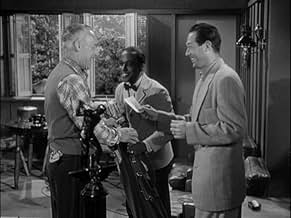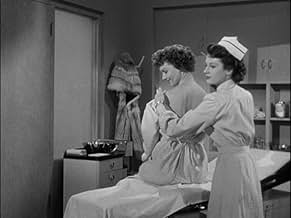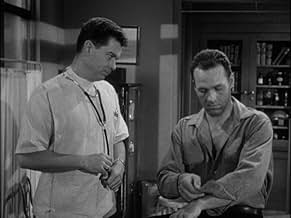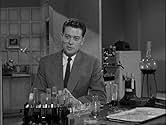ÉVALUATION IMDb
5,8/10
1,1 k
MA NOTE
Ajouter une intrigue dans votre langueA doctor returning from the Korean War to his hometown in Pennsylvania must choose what next to do with his life.A doctor returning from the Korean War to his hometown in Pennsylvania must choose what next to do with his life.A doctor returning from the Korean War to his hometown in Pennsylvania must choose what next to do with his life.
Philip Ahlm
- Minor Role
- (uncredited)
Elsie Baker
- Mrs. Olzoneski
- (uncredited)
Mary Benoit
- Party Guest
- (uncredited)
Avis en vedette
Maybe if John Garfield had been cast instead of Charlton Heston (who looks and moves like Frankinstein's monster here); and if the producers (writers? director?) had not backed away from the mine safety, health, and company criminal negligence theme that packs a punch in the first ten minutes of the movie.
This film is an 83 minute sermon on selflessness vs selfishness, with particular emphasis on the medical profession. The dialogue is full of grandiose turns of phrase that often mean nothing and do not advance the plot. No one's acting stands out because almost everyone is playing a one-dimensional type.
Charlton Heston stars as the only character with any choices to make or an arc to follow. At the start of the story, he plays a skilled military surgeon on leave after the death of his brother. He is initially content to remain in the army where he has been doing good. However, immediately upon arriving in his old hometown, he is offered two positions in private practice. One serving the poor for little pay, one coddling the wealthy for big bucks. He doesn't even have to think about it. Lizabeth Scott plays his new girlfriend, although there is no chemistry between them at all. They both profess their love for the other, but his interest in her seems to be her rich friends, her interest in him is his status as the current fashion.
In case Heston's "bad choices" are not obvious enough, another young doctor and a nurse who both care more about people than money are provided for contrast. Both came to town because they were so impressed by Heston when he was a "real" doctor while in the army. Could that mean he might yet choose the right path?
Finally, to underline the film's version of right vs wrong choices even further is Mildred Dunnock as Heston's mother. She proudly lives in poverty and is distressed that her two sons both preferred a wealthy lifestyle and the corrupting influence of rich women. Neither of her sons appear to have done anything to help out their mother, not for any reason explained in the script, but just because for the sake of the film, everyone must be identified as poor or rich.
Subtle this script is not. Once everything is set up for us, with all the "correct" choices clearly flagged, the rest of the film is just following a predictable path (with some nonsensical speeches) until Heston reaches all the right conclusions.
Charlton Heston stars as the only character with any choices to make or an arc to follow. At the start of the story, he plays a skilled military surgeon on leave after the death of his brother. He is initially content to remain in the army where he has been doing good. However, immediately upon arriving in his old hometown, he is offered two positions in private practice. One serving the poor for little pay, one coddling the wealthy for big bucks. He doesn't even have to think about it. Lizabeth Scott plays his new girlfriend, although there is no chemistry between them at all. They both profess their love for the other, but his interest in her seems to be her rich friends, her interest in him is his status as the current fashion.
In case Heston's "bad choices" are not obvious enough, another young doctor and a nurse who both care more about people than money are provided for contrast. Both came to town because they were so impressed by Heston when he was a "real" doctor while in the army. Could that mean he might yet choose the right path?
Finally, to underline the film's version of right vs wrong choices even further is Mildred Dunnock as Heston's mother. She proudly lives in poverty and is distressed that her two sons both preferred a wealthy lifestyle and the corrupting influence of rich women. Neither of her sons appear to have done anything to help out their mother, not for any reason explained in the script, but just because for the sake of the film, everyone must be identified as poor or rich.
Subtle this script is not. Once everything is set up for us, with all the "correct" choices clearly flagged, the rest of the film is just following a predictable path (with some nonsensical speeches) until Heston reaches all the right conclusions.
Army surgeon Charlton Heston is happy with his work, but a visit home to the coal-mining town he was born in,as well as society vamp Lizabeth Scott, make him think there's more to life than patching up wounded soldiers. At first he's interested in serving the poor people he grew up with. However Miss Scott gets him a job with society doctor Lester Matthews and becomes engaged to him. He finds his practice consists largely of giving nostrums to wealthy women at $250 a visit. Finally his nurse, Dianne Foster, leaves him to assist Dr. Arthur Franz, who's taking care of the miners and their families. His crisis of faith, however, is yet to come.
Heston has already developed his deep-throated growl in this movie, although he has not perfected it. It has a quality to it that I think is supposed to denote dissatisfaction, but sounds whiny to me. In a world where everyone else struggles for status and wealth, it's up to the woman at the top of both trees to point out the necessity of honesty and honor; well, she's the only one who can.
Heston has already developed his deep-throated growl in this movie, although he has not perfected it. It has a quality to it that I think is supposed to denote dissatisfaction, but sounds whiny to me. In a world where everyone else struggles for status and wealth, it's up to the woman at the top of both trees to point out the necessity of honesty and honor; well, she's the only one who can.
The splendour of this film is the outstanding dialog, which is enjoyable and intelligent all the way, in all its turnings around about ethics, conscience, ambition, vocation and the difficult question of what is right. Lizabeth Scott is not bad, she is just beautiful and charming and irresistible and can't do without her life in luxury at the top, and when she wants Charlton Heston to have the same she only means well. But Charlton is a doctor here with some experience out of two wars, the world war and the Korea war, and he finds life at the top somewhat difficult to adapt to with all its cocktail parties, rich patients of hypochondria, glamour and luxury, which just doesn't fit into what he has been brought up to. The film has been compared to Cronin's "The Citadel", and it's a good comparison, Cronin could have written this story, but it is still sharper and more poignant, as the condition of the coal miners play an important part here, although not quite as great as in "The Stars Look Down", which is also worth remembering in this context. The acting is superb, Ray Collins has an important part, and the ending is without upsets. It is all logical and natural, and Charlton Heston remains as admirable as Lizabeth Scott remains as beautiful as ever.
A freshly discharged army doctor passes up practice in blue-collar hometown for big- paying practice among a city elite that includes a cool blonde dilettante.
I got this epic as part of a package claiming to be all noir. The only thing noir in this movie are the several night time shots— otherwise, no crime, no hand of fate, and no moody atmosphere. Only blonde seductress Helen (Scott) instead, and she's hardly the standard spider woman. Actually, the movie's more b&w soap opera than anything else.
That's not to say there're no redeeming features. I guess I wasn't aware of what a racket doctoring among the wealthy can be. The movie shows what a cushy pandering job it can be, treating headaches with high-priced medicines and smarmy words. And coming from a muckraker like novelist McCoy, e.g. They Shoot Horses Don't They (1969), I take it as factually based.
And surprise, surprise, to me, at least—actor Heston is quite animated as the sell-out doctor. I guess this was before he stiffened into a big-screen movie god, but whatever, he's quite persuasive in the role. Still, I thought the script made the doc's transition from honorable soldier to money-grubbing pill pusher much too easy, more like a movie device than a character change. Nonetheless, get a load of the coal mine scenes, quite realistic and well done.
But, bottom line, the story follows a familiar pattern with no surprises, suggesting a production serving mainly as a vehicle for Columbia's newest hunk.
I got this epic as part of a package claiming to be all noir. The only thing noir in this movie are the several night time shots— otherwise, no crime, no hand of fate, and no moody atmosphere. Only blonde seductress Helen (Scott) instead, and she's hardly the standard spider woman. Actually, the movie's more b&w soap opera than anything else.
That's not to say there're no redeeming features. I guess I wasn't aware of what a racket doctoring among the wealthy can be. The movie shows what a cushy pandering job it can be, treating headaches with high-priced medicines and smarmy words. And coming from a muckraker like novelist McCoy, e.g. They Shoot Horses Don't They (1969), I take it as factually based.
And surprise, surprise, to me, at least—actor Heston is quite animated as the sell-out doctor. I guess this was before he stiffened into a big-screen movie god, but whatever, he's quite persuasive in the role. Still, I thought the script made the doc's transition from honorable soldier to money-grubbing pill pusher much too easy, more like a movie device than a character change. Nonetheless, get a load of the coal mine scenes, quite realistic and well done.
But, bottom line, the story follows a familiar pattern with no surprises, suggesting a production serving mainly as a vehicle for Columbia's newest hunk.
Le saviez-vous
- AnecdotesAccording to December 1950 articles in The Hollywood Reporter and the Los Angeles Times, producer Hal B. Wallis purchased the rights to the novel before it was published for $100,000 ($1.3M in 2024). Wallis intended the leads to be Burt Lancaster and Patricia Neal and that the project was to be filmed at Paramount. It never got off the ground, and Wallis ended up selling the rights to Columbia in early 1953.
- GaffesThe beginning scenes of movie show coal mine operations in Coalville, PA. The railroad caboose was from ATSF (Atchison, Topeka, and Santa Fe). That railroad never had operations in Pennsylvania.
- Citations
Dr. Tom Owen: [on the phone with his wife] Oh, I'm interviewing nurses, of course... Don't be silly, darling - of course she'll be fat and ugly. I do insist on good legs, though.
Meilleurs choix
Connectez-vous pour évaluer et surveiller les recommandations personnalisées
- How long is Bad for Each Other?Propulsé par Alexa
Détails
- Durée1 heure 23 minutes
- Couleur
Contribuer à cette page
Suggérer une modification ou ajouter du contenu manquant

Lacune principale
By what name was Bad for Each Other (1953) officially released in India in English?
Répondre
